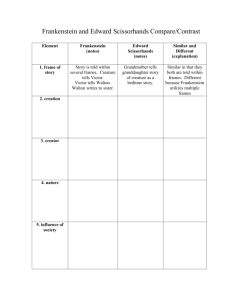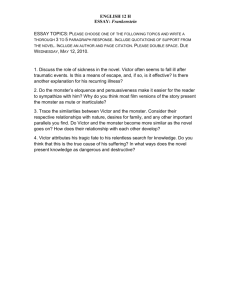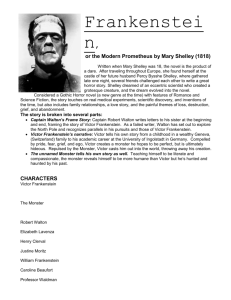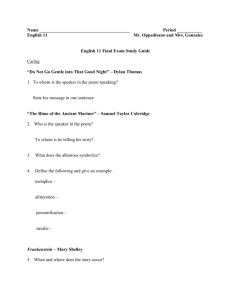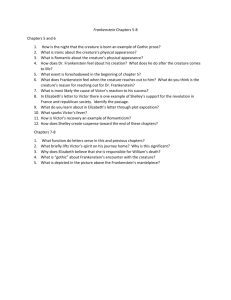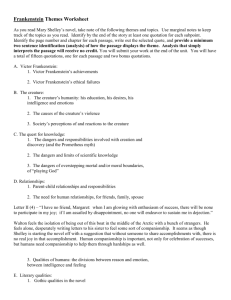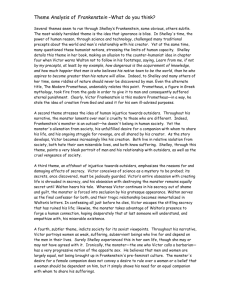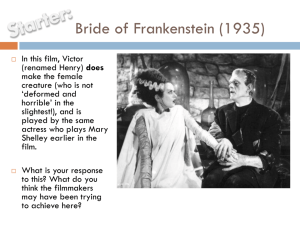Frankenstein - English
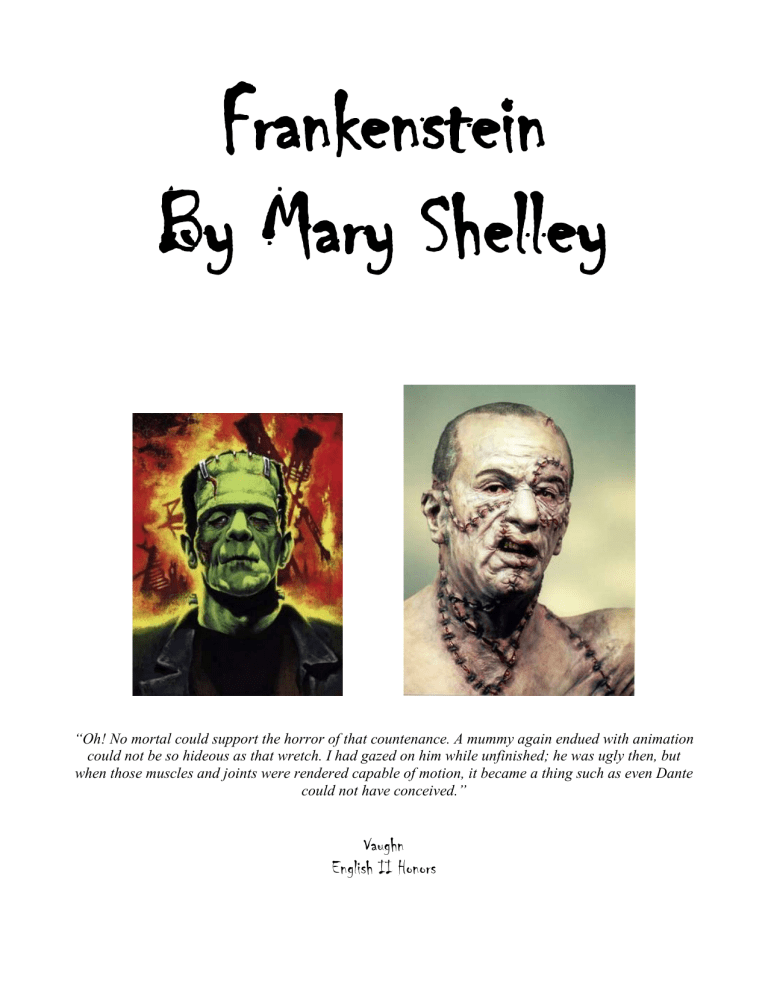
Frankenstein
By Mary Shelley
“Oh! No mortal could support the horror of that countenance. A mummy again endued with animation could not be so hideous as that wretch. I had gazed on him while unfinished; he was ugly then, but when those muscles and joints were rendered capable of motion, it became a thing such as even Dante could not have conceived.”
Vaughn
English II Honors
Date
Thurs. 10/13 (A)
Fri. 10/14 (B)
Mon. 10/17 (C)
Tue. 10/18 (D)
Wed. 10/19 (E)
Thur. 10/20 (A)
Fri. 10/21 (B)
Mon. 10/24 (C)
Tue. 10/25 (D)
Wed. 10/26 (E)
Thur. 10/27 (A)
Fri. 10/28 (B)
Mon. 10/31 (C)
Tue. 11/1 (D)
Wed. 11/2 (E)
Thur. 11/3 (A)
Fri. 11/4 (B)
Mon. 11/7 (C)
Tues. 11/8 (D)
Wed. 11/9 (E)
Mon. 11/14
Unit Schedule
Topic
Broad topic overview / handout packets
NWEA Testing
Context: Introducing Frankenstein
Class does not meet on D days
Mary Shelley’s Framing Device
Frankenstein’s Early Years
Creating a Monster
Reading/Assignment
Introduction and Preface
Letters; Ch. 1-2
Quote Journal
Read “Rime of the Ancient
Mariner” – poem can be found free online and answer questions
Ch. 3-5
Quote Journal
Ch. 6-10
Quote Journal
Ch. 11-17
Quote Journal
The Creature’s Story
Class does not meet on D days
The Bargain Broken
Victor Frankenstein: Characterization
Misery Loves Company
More Themes in Frankenstein
Quote Journal Check
Class does not meet on D days
Poetic Connections: Shelley & Wordsworth
Essay Writing – Thesis and Outline
Essay Writing – Draft 1
Ch. 18-24
Quote Journal
Quote Journal
Quote Journal
Quote Journal
Finalize outline
Continue writing
Essay Writing – Draft 1
Class does not meet on D days
Peer Editing
Essays due
Continue writing
Finalize essays
Quote Journal
You will be responsible for keeping a quote journal in your notebooks throughout your reading. As you read, record quotes from the text that develop the various themes in the novel. You do not need to stick to just one theme. Explore your options. Some of the central themes in the novel include:
Idealism
Vengeance
The quest for knowledge
Compassion
Self-destruction
Destiny and free will
Isolation
Appearance
For each entry, you must include:
1.
the quote; the chapter/page number
2.
theme
3.
context notes
4.
analysis notes
You may format this in linear format as a running journal or in chart form. For example:
Quote
“Frankenstein! You belong then to my enemy – to him towards whom I have sworn eternal revenge; you shall be my first victim.”
(Chapter 16)
Theme Context
Vengeance Monster learns that everyone is disgusted by him so he swears revenge on basically everyone, including Frankenstein.
Shows some compassion by rescuing a girl. Gets shot by a man who thinks monster is attacking the girl. Hides out in woods.
Goes to Geneva and finds
Victor’s bro, William.
Strangles him.
Requirements:
At least one quote per chapter
Themes may vary
Full sentences are not necessary, but full thoughts are
All four elements for every quote
Analysis
Feeling very slighted, frustrated, misunderstood.
The monster decides to kill
William because he is related to Victor. He hopes that he can make Victor as alone and miserable as he is himself. The idea of revenge consumes the creature and he will go to any extent to get it. In fact, it’s all consuming and his reason for being now. It doesn’t seem there will be any turning back
Context: Introducing Frankenstein
Frankenstein: The Introduction and the Preface
1.
What circumstances led Mary Shelley to write the novel? Check the internet to discover global weather conditions during the summer of 1816.
2.
What writers and literary works does she mention? What do these citations reveal about her?
3.
Where was she when she wrote Frankenstein? How does this location connect with the novel?
4.
Who were her companions? Use or online resources to find some basic facts about them.
5.
Who suggested the idea of writing ghost stories? How did Mary Shelley react?
6.
Where did she get the basic idea for her novel?
7.
What central theme does she herself articulate?
British Romanticism
1.
What are four emphases of British Romanticism?
2.
Use print or online resources to identify three additional aspects of British Romanticism.
3.
What do you think would be the opposite of a Romantic? Explain.
4.
Imagine that a person inherited five acres of primal forest in Pennsylvania. What would a
Romantic do with the land? What would the opposite kind of person do?
A Modern Prometheus
Prometheus is a figure from classical mythology. Like many mythological figures, he is involved in a variety of tales, and the stories are not always exactly consistent with one another. Use print or online resources to discover information about Prometheus, and answer the following questions.
1.
With what did the Roman writer Ovid credit Prometheus?
2.
How, according to myth, did Zeus’s and Prometheus’s attitudes toward humans differ?
3.
What gift did Prometheus give humankind? Why was this gift important?
4.
What was Prometheus’s punishment?
5.
What does the story of Prometheus have in common with the biblical story of the Tower of
Babel?
6.
What does Prometheus have in common with the tragic King Oedipus?
7.
What does the subtitle of the novel suggest about Mary Shelley’s character, Frankenstein?
Mary Shelley’s Framing Device
Robert Walton’s Letters
1.
What is Robert Walton’s ambition? Why has he chosen this goal?
2.
What does he sorely miss?
3.
Locate his journey on a map. Where exactly is he?
4.
What two strange figures does he mention in the fourth letter?
5.
How does Walton respond to the stranger?
6.
What does the stranger mean by the comment, “Unhappy man! Do you share my madness?”
The Rime of the Ancient Mariner
1.
In Part 1, why is the wedding guest agitated? What shocking statement does the mariner make at the end of the section?
2.
Part 2 includes some very famous lines. Did you notice them? What is the mariner’s punishment at the end of the section?
3.
What happens in Part 3?
4.
What does the mariner emphasize in Part 4?
5.
What happens in Part 5?
6.
In Part 6, where does the mariner land? What does he want to do?
7.
What do we find out about the mariner in Part 7?
8.
Reread the last four stanzas. What theme statements do you see?
Frankenstein’s Early Years
Discussion Questions
1.
How does Victor characterize his early years?
2.
What factors in his childhood predispose him for the kind of solitary effort he makes in his studies?
3.
Who is Elizabeth? How does she come to be part of Victor’s family?
4.
Who is Henry Clerval?
5.
How do Elizabeth and Henry affect Victor’s life and his studies?
6.
What ideals stir in Victor’s mind from his early reading?
7.
Near the end of chapter 2, Victor comments, “When I look back, it seems to me as if this almost miraculous change of inclination and will was the immediate suggestion of the guardian angel of my life – the last effort made by the spirit of preservation to avert the storm that was even then hanging in the stars and ready to envelop me.” What does he mean?
8.
What event delays Victor’s departure for the university? How does it affect him?
9.
What is the impact of the last sentence in chapter 3?
Creating a Monster
Discussion Questions
1.
What field of study does Victor Frankenstein pursue at the university in Ingolstadt? For what aim?
2.
What is wrong with Victor’s lifestyle at the university?
3.
What is the material out of which Victor makes his creature? How graphic are Mary Shelley’s descriptions?
4.
What is Victor’s emotional and physical reaction to the sight of his creature? What specific aspect of the monster’s appearance horrifies Victor?
5.
What first death does Victor feel responsible for, and why?
6.
Who is Justine? Why does she also die?
7.
How does Henry Clerval help after Victor’s ordeal begins?
8.
When the Frankenstein family moves to the country, what effect does the move have on
Victor? How does this reflect a Romantic perspective?
9.
In chapter 5, Victor quotes lines from “The Rime of the Ancient Mariner.” Why?
10.
At the end of chapter 10, whom does Victor meet? Where? What is the result?
The Creature’s Story
The Creature’s Story
1.
At the end of chapter 10, what factors motivate Victor Frankenstein to agree to listen to his creation story?
2.
The first several pages of chapter 11 narrate specifically the creature’s growth in consciousness, much as an infant (in a longer chronological period) would awaken gradually to life. What are some details of the creature’s innocent awakening which move you? Do any seem unusually poignant? Why?
3.
The creature’s successive mistreatment by every human being he meets gradually changes his response to people. Does this personality change seem normal to you under the circumstances? Can you give any modern example of such a change as presented in film, writing, or real life?
4.
What are some human lessons the creature learns from observing the De Laceys surreptitiously?
5.
Do you see the advent of Safie as an event that may cause the creature pain? What is your reaction as you read Shelley’s description of her effect on Felix?
6.
How do you think the story would change if Felix, Safie, and Agatha did not interrupt the monster’s conversation with the blind old man at the end of chapter 15?
7.
At the end of chapter 13 the monster comments on his “additional love and reverence for my protectors (for so I loved, in an innocent, half-painful self-deceit, to call them).” In light of that comment, how does Felix’s blow affect him?
8.
In addition to hearing from the conversations of the De Laceys and Safie the past history of his
“beloved cottagers,” the creature is influenced by the discovery of some books. What are they? How does he respond to them?
9.
How does the monster learn details of his own creation? How do those details differ from the description of the creation of Adam?
10.
The monster confirms Frankenstein’s suspicions about the murder of his little brother. What happened?
The De Lacey Family
1.
What does the monster learn of the family’s history?
2.
What does the narrative stress about each member of the family? (M. De Lacey, Felix, Agatha,
Safie)
3.
What elements of Romanticism are evident in the portrayal of the family?
4.
Why does the monster provide services for the family? What does he want?
5.
If acceptance into the De Lacey family would be a kind of paradise for Frankenstein’s creation, what do the reactions of all three young people at the end of chapter 15 represent?
Paradise Lost, Part 1
Reading Paradise Lost deeply influences Frankenstein’s creature, who has suffered the pain of rejection. He finds in the richness of its pages some sustenance to bear him up in his misery. In your notebook, write a summary of Part 1, then write a paragraph in which you explain the epic’s powerful impact on the creature.
The Bargain Broken
Discussion Questions
1.
What thoughts do you suppose are in Elizabeth’s mind between Victor’s visit home at the beginning of chapter 18 and her letter offering to free him from any obligation to her?
2.
How and why does Victor delay completing his second creation?
3.
Why are we not surprised later to find that Henry has been murdered?
4.
What does Victor do with his second creation? Why does he make these choices?
5.
How does Victor end up in Ireland? What doe he find there?
6.
How does Victor manage to clear his name in the crime?
7.
What ironies are involved in Victor’s marriage to Elizabeth?
8.
Does Victor every tell anyone the secret of his creation?
9.
To what does Victor dedicate his life?
10.
What does Walton want Victor to do?
Poetic Connections: Percy Bysshe Shelley
Mutability
We are as clouds that veil the midnight moon;
How restlessly they speed, and gleam, and quiver,
Streaking the darkness radiantly! – yet soon
Night closes round, and they are lost for ever;
Or like forgotten lyres, whose dissonant strings
Give various response to each varying blast,
To whose frail frame no second motion brings
One mood or modulation like the last.
We rest, --A dream has power to poison sleep;
We rise, --One wandering thought pollutes the day;
We feel, conceive or reason, laugh or weep;
Embrace fond woe, or cast our cares away;
It is the same! –For, be it joy or sorrow,
The path of its departure still is free:
Man’s yesterday may ne’er be like his morrow;
Nought may endure but Mutability.
--Percy Bysshe Shelley
Lines Composed a Few Miles above Tintern Abbey
By William Wordsworth
FIVE years have past; five summers, with the length
Of five long winters! and again I hear
These waters, rolling from their mountain-springs
With a soft inland murmur .--Once again
Do I behold these steep and lofty cliffs,
That on a wild secluded scene impress
Thoughts of more deep seclusion; and connect
The landscape with the quiet of the sky.
The day is come when I again repose
Here, under this dark sycamore, and view 10
These plots of cottage-ground, these orchard-tufts,
Which at this season, with their unripe fruits,
Are clad in one green hue, and lose themselves
'Mid groves and copses. Once again I see
These hedge-rows, hardly hedge-rows, little lines
Of sportive wood run wild: these pastoral farms,
Green to the very door; and wreaths of smoke
Sent up, in silence, from among the trees!
With some uncertain notice, as might seem
Of vagrant dwellers in the houseless woods, 20
Or of some Hermit's cave, where by his fire
The Hermit sits alone.
These beauteous forms,
Through a long absence, have not been to me
As is a landscape to a blind man's eye:
But oft, in lonely rooms, and 'mid the din
Of towns and cities, I have owed to them
In hours of weariness, sensations sweet,
Felt in the blood, and felt along the heart;
And passing even into my purer mind,
With tranquil restoration:--feelings too 30
Of unremembered pleasure: such, perhaps,
As have no slight or trivial influence
On that best portion of a good man's life,
His little, nameless, unremembered, acts
Of kindness and of love. Nor less, I trust,
To them I may have owed another gift,
Of aspect more sublime; that blessed mood,
In which the burthen of the mystery,
In which the heavy and the weary weight
Of all this unintelligible world, 40
Is lightened:--that serene and blessed mood,
In which the affections gently lead us on,--
Until, the breath of this corporeal frame
And even the motion of our human blood
Almost suspended, we are laid asleep
In body, and become a living soul:
While with an eye made quiet by the power
Of harmony, and the deep power of joy,
We see into the life of things.
If this
Be but a vain belief, yet, oh! how oft-- 50
In darkness and amid the many shapes
Of joyless daylight; when the fretful stir
Unprofitable, and the fever of the world,
Have hung upon the beatings of my heart--
How oft, in spirit, have I turned to thee,
O sylvan Wye! thou wanderer thro' the woods,
How often has my spirit turned to thee!
And now, with gleams of half-extinguished thought,
With many recognitions dim and faint,
And somewhat of a sad perplexity, 60
The picture of the mind revives again:
While here I stand, not only with the sense
Of present pleasure, but with pleasing thoughts
That in this moment there is life and food
For future years. And so I dare to hope,
Though changed, no doubt, from what I was when first
I came among these hills; when like a roe
I bounded o'er the mountains, by the sides
Of the deep rivers, and the lonely streams,
Wherever nature led: more like a man 70
Flying from something that he dreads, than one
Who sought the thing he loved. For nature then
(The coarser pleasures of my boyish days,
And their glad animal movements all gone by)
To me was all in all.--I cannot paint
What then I was. The sounding cataract
Haunted me like a passion: the tall rock,
The mountain, and the deep and gloomy wood,
Their colours and their forms, were then to me
An appetite; a feeling and a love, 80
That had no need of a remoter charm,
By thought supplied, nor any interest
Unborrowed from the eye.--That time is past,
And all its aching joys are now no more,
And all its dizzy raptures. Not for this
Faint I, nor mourn nor murmur, other gifts
Have followed; for such loss, I would believe,
Abundant recompence. For I have learned
To look on nature, not as in the hour
Of thoughtless youth; but hearing oftentimes 90
The still, sad music of humanity,
Nor harsh nor grating, though of ample power
To chasten and subdue. And I have felt
A presence that disturbs me with the joy
Of elevated thoughts; a sense sublime
Of something far more deeply interfused,
Whose dwelling is the light of setting suns,
And the round ocean and the living air,
And the blue sky, and in the mind of man;
A motion and a spirit, that impels 100
All thinking things, all objects of all thought,
And rolls through all things. Therefore am I still
A lover of the meadows and the woods,
And mountains; and of all that we behold
From this green earth; of all the mighty world
Of eye , and ear,--both what they half create,
And what perceive; well pleased to recognise
In nature and the language of the sense,
The anchor of my purest thoughts, the nurse,
The guide, the guardian of my heart, and soul 110
Of all my moral being.
Nor perchance,
If I were not thus taught, should I the more
Suffer my genial spirits to decay:
For thou art with me here upon the banks
Of this fair river; thou my dearest Friend,
My dear, dear Friend; and in thy voice I catch
The language of my former heart, and read
My former pleasures in the shooting lights
Of thy wild eyes. Oh! yet a little while
May I behold in thee what I was once, 120
My dear, dear Sister! and this prayer I make,
Knowing that Nature never did betray
The heart that loved her; 'tis her privilege,
Through all the years of this our life, to lead
From joy to joy: for she can so inform
The mind that is within us, so impress
With quietness and beauty, and so feed
With lofty thoughts, that neither evil tongues,
Rash judgments, nor the sneers of selfish men,
Nor greetings where no kindness is, nor all 130
The dreary intercourse of daily life,
Shall e'er prevail against us, or disturb
Our cheerful faith, that all which we behold
Is full of blessings. Therefore let the moon
Shine on thee in thy solitary walk;
And let the misty mountain-winds be free
To blow against thee: and, in after years,
When these wild ecstasies shall be matured
Into a sober pleasure; when thy mind
Shall be a mansion for all lovely forms, 140
Thy memory be as a dwelling-place
For all sweet sounds and harmonies; oh! then,
If solitude, or fear, or pain, or grief,
Should be thy portion, with what healing thoughts
Of tender joy wilt thou remember me,
And these my exhortations! Nor, perchance--
If I should be where I no more can hear
Thy voice, nor catch from thy wild eyes these gleams
Of past existence--wilt thou then forget
That on the banks of this delightful stream 150
We stood together; and that I, so long
A worshipper of Nature, hither came
Unwearied in that service: rather say
With warmer love--oh! with far deeper zeal
Of holier love. Nor wilt thou then forget,
That after many wanderings, many years
Of absence, these steep woods and lofty cliffs,
And this green pastoral landscape, were to me
More dear, both for themselves and for thy sake!
Final Essay
Below are some of the central themes in Mary Shelley’s Frankenstein:
Idealism
Vengeance
The quest for knowledge
Compassion
Self-destruction
Destiny and free will
Isolation
Appearance
Choose two of the above themes and write an essay showing how the author develops them in the novel.
In your planning, consider the following to help you get organized:
Which characters embody or display the above traits and why?
How do the characters’ actions affect them, other people, and the world around them?
Are there any symbols in the novel that represent the above themes?
What is the author’s message in presenting the above themes as she does?
Use information from the book and your notes (discussion notes, quote journal) to support your ideas.
Use proper MLA format.
Refer to the essay rubric for grading information.
Category
Rubric for Analysis Essay
Vaughn
Criteria Poor
RATING
Exemplary
1. Essay is structured around a valid, insightful, and convincing argument. 5 6 7 8 9 10
2. Thesis is easily identifiable and clearly articulated; it is neither broad nor vague.
5 6 7 8 9 10
3. Thesis is consistently supported with main ideas and details from the text.
4. Relevant textual evidence is prevalent throughout the essay’s supporting arguments.
5. Analysis of textual evidence and literary elements is concise, accurate, and insightful.
6. The student uses an effective balance of personal interpretation and outside criticism.
7. The introduction and conclusion compellingly utilize all required essay elements.
5 6 7 8 9 10
5 6 7 8 9 10
5 6 7 8 9 10
5 6 7 8 9 10
5 6 7 8 9 10
8. The essay contains sophisticated transitions to set up ideas and quotations. 5 6 7 8 9 10
9. The essay is virtually free of grammar and usage errors.
10. The essay follows proper MLA format and submission guidelines.
5 6 7 8 9 10
5 6 7 8 9 10
TOTAL: __________
Comments:


